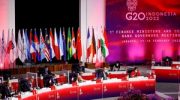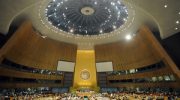According to the doctrine, Russia has already managed to strengthen its image as a democratic country.

President Vladimir Putin endorsed a new foreign policy doctrine based on the concept of “Russian peace” — a concept that his ideologues used to justify intervention abroad in support of Russian-speaking citizens. This is reported by Reuters.
In the 31-page “humanitarian policy” published six months after the full-scale invasion of Ukraine, it is stated that Russia must “protect, protect and develop the traditions and ideals of the Russian world”.< /p>
Despite the fact that the strategy is presented as a kind of “soft power strategy”, it legitimizes and officially consolidates theses and methods of Russian politics and religion, which were used to justify Moscow's occupation of part of Ukraine and support for separatist pro-Russian formations in its east.< /p>
“The Russian Federation provides support to compatriots living abroad in the exercise of their rights, ensures the protection of their interests and the preservation of Russian cultural identity,” the document states.
Read also: Zelensky : The legend about the “great state “Russia”” should be forgotten
It also emphasizes that Russia's ties with its compatriots abroad have allowed it to “strengthen the image of a democratic country on the international arena, striving to create a multipolar world.”
According to the new policy, Russia should expand cooperation with Slavic countries, China and India, as well as strengthen our ties with the Middle East, Latin America strong> and Africa.
The document states that Moscow should continue to deepen its ties with Abkhaziaand Ossetia, two Georgian regions recognized by Moscow as independent after its war against Georgia in 2008, as well as two separatist entities in eastern Ukraine, the self-proclaimed “DPR” and “LPR” .
Read also: Rasmussen calls on the US to increase support for Ukraine and upset the autocrats
Putin has emphasized for many years that he considers the fate of about 25 million ethnic Russians who have found themselves outside Russia in new independent states after the collapse of the Soviet Union in 1991. He called this event a geopolitical catastrophe.
Russia continues to consider the former Soviet space, from the Baltics to Central Asia, as its legitimate sphere of influence. Most of these countries and the West are fiercely resisting this idea.
Related video
At the end of July, Vladimir Putin approved the new Naval Doctrine. He called the main threats to the Russian Federation “the course of the United States for dominance in the World Ocean and the growth of NATO activity”.


